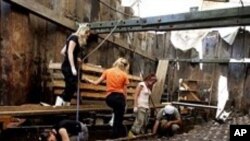The ancient and modern worlds are colliding head on in the trenches of Turkey's largest city as an engineering project to build a tunnel under Istanbul's Bosphorus waterway continues. The massive venture, called the Marmaray Project, aims to connect Asia and Europe by rail - and revitalize Istanbul's transport system. But, history seems to be getting in the way of progress as workers surveying the site discovered the remains of what was once a Byzantine port.
Archeologists are working around the clock on a huge swathe of land is being taken apart little by little. Eventually it will be the city's new transportation hub. But for now, it is a massive archaeological dig.
Alongside thousands of clay pots once used for carrying cargo, are sunken ships, at the last count 34, dating back more than 1,000 years.
In charge of the operation is Zeynep Kiziltan. She's head of archeology museums in Istanbul, and for her this is a discovery of a life time.
She says the port that was built in the 4th century and was actively used till the 11th. The boats here - provided food to the city, especially grain ships from Egypt - were coming to this port and docking here. She says, it was what she would call now an "international trading port" of those times. So much of the port is intact it gives us an insight in to the world."
As the boats are unearthed in their graves of sand and silt, they are shipped around the country to archeology centers to be preserved. Turkey's archeology community is now dealing with the wealth of the discoveries. But everyone is aware that time is against them.
That's because the port is holding up one of the largest engineering projects of its type in the world. As the archeologist dig only a few meters away, engineers work on the tunnel that will connect the two sides of Istanbul to ease the city's traffic problems.
But, the port's discovery by the tunnel excavation is proving to be a nightmare for its builders.
Fifty meters below the Bosphorus waterway, workers are toiling away to make up for the three years lost to the archeology excavation. The tunnel, when complete, will allow subway trains to run the length of the city carrying a million of people a day.
Despite the challenges, the project's chief engineer Emre Can is taking a philosophical approach.
"Our project competition dates will be postponed postponed postponed, nearly three years," he said. "Our costs will be increased But for this project we waited one hundred years. So we can wait three more years."
Repercussions of the delay, however, are being felt 50 meters above.
As the delay to the tunnel means restrictions on use of the Bosphorus waterway where supertankers carrying Russian oil to world markets are being forced to wait.
Archeologist Kan Ozdemir says they are all aware the situation.
We do feel the pressure of time as the tunnel is a project of the state and it has big financial costs, he says. So we have to work faster and in the best way we can. But archeology is not a job that you can rush, but we work hard.
Project chief Zeynep Kiziltan says, for now, the government has promised they can have as much time as they need. But, she adds, working with the tunnel engineers can at times be a more than a little tense.
We do have quite heated arguments from time to time, as the construction team frequently wants us to give up areas we are excavating before we've finished, she says. Massive construction machines are literally over our shoulder waiting for us to finish, which can be intimidating. So sure we do have conflicts. But for now we still have the final say, although I don't know long this will last, she says.




